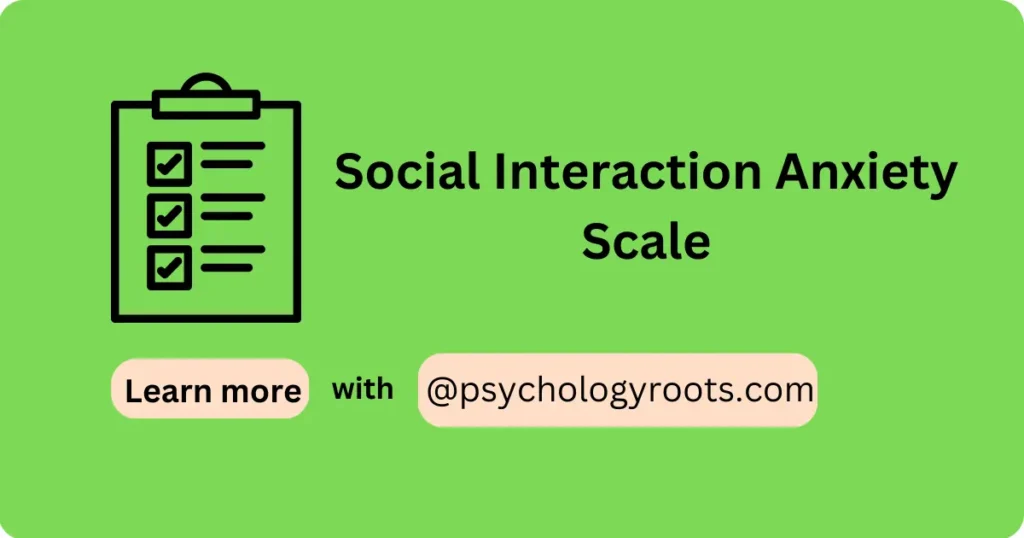Table of Contents
Social Interaction Anxiety Scale
Here in this post, we are sharing the “Social Interaction Anxiety Scale”. You can read psychometric and Author information. We have thousands of Scales and questionnaires in our collection (See Scales and Questionnaires). You can demand us any scale and questionnaires related to psychology through our community, and we will provide you with a short time. Keep visiting Psychology Roots.
About Social Interaction Anxiety Scale
Scale Name
Social Interaction Anxiety Scale
Author Details
Richard P. Mattick and Janeen C. Clarke
Translation Availability
Not Sure

Background/Description
The Social Interaction Anxiety Scale (SIAS) is a widely used tool for assessing the distress and anxiety people experience in social situations. Developed in 1998 by psychologists Richard P. Mattick and Janeen C. Clarke, it was born from the need for a reliable and specific measure of social anxiety beyond just performance fears.
The SIAS tackles the broader anxieties surrounding everyday social interactions, like meeting new people, making conversation, or avoiding public scrutiny. Its 20 statements, rated on a scale of 0 to 4, delve into fears of awkwardness, judgment, and saying something embarrassing. This nuanced approach makes it a valuable tool for both identifying and tracking social anxiety disorder (SAD).
From a clinical standpoint, the SIAS helps professionals diagnose SAD and monitor treatment progress. For individuals struggling with social anxiety, the scale can offer self-awareness and a basis for seeking help. Understanding the specific areas of their anxiety can empower them to develop coping strategies and gradually approach feared situations.
While not a standalone diagnostic tool, the SIAS remains a significant instrument in the field of social anxiety research and management. Its contribution to understanding and addressing this common issue continues to benefit both mental health professionals and individuals seeking to navigate the complexities of social interaction.
Administration, Scoring and Interpretation
- Paper Pencil most common method, where individuals are given a copy of the SIAS questionnaire and asked to read and answer each item on their own.
- Each item consists of a statement about social anxiety symptoms, followed by a 5-point Likert scale ranging from 0 (“Not at all characteristic or true of me”) to 4 (“Extremely characteristic or true of me”).
- Individuals are instructed to circle the number that best reflects their experience of the symptom in the past week.
- This method is relatively quick and easy to administer, making it suitable for research and clinical settings.
Reliability and Validity
The SIAS has been extensively researched and has demonstrated strong reliability and validity, making it a widely trusted tool for assessing social anxiety. Here’s a breakdown of both aspects:
- Internal consistency: Measured by Cronbach’s alpha, the SIAS consistently shows high internal consistency (typically above 0.90), meaning the individual items on the scale are well-correlated and measure the same underlying construct (social anxiety) effectively.
- Test-retest reliability: The SIAS scores remain relatively stable when the scale is administered twice over a short period (e.g., a week or two), indicating good consistency in measuring social anxiety over time.
- Convergent validity: The SIAS shows strong correlations with other established measures of social anxiety, such as the Social Phobia Inventory (SPAI) and the Fear of Negative Evaluation Scale (FPES). This means it measures similar things as these other tools, confirming its accuracy in assessing social anxiety.
- Discriminant validity: The SIAS can differentiate between individuals with social anxiety and those without, as well as between different types of social anxiety (e.g., performance anxiety vs. generalized social anxiety). This indicates that it captures specific aspects of social anxiety rather than just general anxiety or distress.
- Criterion validity: The SIAS scores correlate with clinical diagnoses of social anxiety disorder, supporting its usefulness in identifying individuals with the condition.
Available Versions
20-Items
Reference
Mattick, R. P., & Clarke, J. C. (2012). Social Interaction Anxiety Scale. Psychological Assessment.
Mattick, R. P., & Clarke, J. C. (1998). Development and validation of measures of social phobia scrutiny fear and social interaction anxiety. Behaviour research and therapy, 36(4), 455-470.
Important Link
Scale File:
Frequently Asked Questions
- What is the SIAS?
A 20-question self-report test measuring social anxiety and discomfort in social situations. - How does it work?
Individuals rate statements about social fears on a 5-point scale (0-4). - Who uses it?
Clinicians to diagnose and track social anxiety in adults and adolescents. - How reliable is it?
Very reliable, with consistent scoring over time and strong correlation with other anxiety measures. - How valid is it?
Accurately identifies social anxiety and differentiates it from general anxiety. - How is it administered?
Paper-and-pencil, computer, or interview format. - Are there limitations?
Potential gender bias and cultural sensitivity concerns, though research is ongoing to address them.
Disclaimer
Please note that Psychology Roots does not have the right to grant permission for the use of any psychological scales or assessments listed on its website. To use any scale or assessment, you must obtain permission directly from the author or translator of the tool. Psychology Roots provides information about various tools and their administration procedures, but it is your responsibility to obtain proper permissions before using any scale or assessment. If you need further information about an author’s contact details, please submit a query to the Psychology Roots team.
Help Us Improve This Article
Have you discovered an inaccuracy? We put out great effort to give accurate and scientifically trustworthy information to our readers. Please notify us if you discover any typographical or grammatical errors.
Make a comment. We acknowledge and appreciate your efforts.
If you have any scale or any material related to psychology kindly share it with us at psychologyroots@gmail.com. We help others on behalf of you.